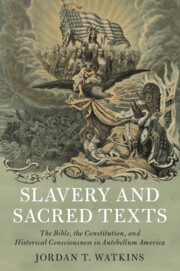 Slavery and Sacred Texts
Slavery and Sacred Texts Published online by Cambridge University Press: 12 June 2021
The prologue spotlights twenty-first-century uses of both the founding era and the biblical past to introduce the book’s central contention that biblical and constitutional debates over slavery cultivated a sense of historical distance in antebellum America. The prologue points to examples of how contemporary Americans both ignore and highlight historical distance in making political use of the founding era and the biblical past. It suggests that in both the antebellum era and in the twenty-first century, politics has shaped American approaches to these pasts and their corrsponding texts – the Bible and the Constitution. At the same time, the prologue maintains that the idea of the past as distant, which has become a common assumption in our period, only began to emerge in the antebellum era. To highlight the continuities and differences between antebellum and twenty-first century thought, the prologue references phrases such as “black lives matter” and “make America great again,” even as it points towards its central focus on the antebellum developments that shed light on the meanings of such phrases.
To save this book to your Kindle, first ensure no-reply@cambridge.org is added to your Approved Personal Document E-mail List under your Personal Document Settings on the Manage Your Content and Devices page of your Amazon account. Then enter the ‘name’ part of your Kindle email address below. Find out more about saving to your Kindle.
Note you can select to save to either the @free.kindle.com or @kindle.com variations. ‘@free.kindle.com’ emails are free but can only be saved to your device when it is connected to wi-fi. ‘@kindle.com’ emails can be delivered even when you are not connected to wi-fi, but note that service fees apply.
Find out more about the Kindle Personal Document Service.
To save content items to your account, please confirm that you agree to abide by our usage policies. If this is the first time you use this feature, you will be asked to authorise Cambridge Core to connect with your account. Find out more about saving content to Dropbox.
To save content items to your account, please confirm that you agree to abide by our usage policies. If this is the first time you use this feature, you will be asked to authorise Cambridge Core to connect with your account. Find out more about saving content to Google Drive.